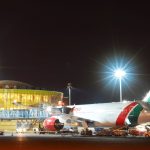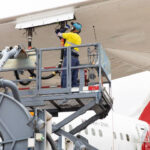Christchurch Airport in New Zealand has become the third airport in the world to reach the new higher level 4 certification of airport industry’s Airport Carbon Accreditation voluntary programme. Whereas Dallas Fort Worth and New Delhi Indira Gandhi airports have been recognised at Level 4+ Transition, Christchurch is the first airport to achieve Level 4 Transformation. The new levels have been brought in by airports body ACI to reflect airport carbon reduction targets that are aligned with the temperature goals of the Paris Agreement. To attain this accreditation, Christchurch has been required to address broader emissions in its carbon footprint that include all the significant operational sources on and off site, as well as demonstrate evidence of actively engaging and leading its stakeholders towards delivering emissions reductions.
“This achievement demonstrates the airport’s firm commitment to invest in a more sustainable future for aviation and for the region it serves,” said Stefano Baronci, Director General for ACI Asia-Pacific. “Without a doubt, it is a remarkable milestone at a time of unprecedented challenges for aviation. For airports, it is essential to recover from Covid-19 in a more agile and sustainable way, and Christchurch Airport is clearly leading the way in working towards decarbonisation. We hope other airports in the region will follow its leadership.”
To achieve Level 4 Transformation of the programme, an airport has to define a long-term carbon management strategy oriented towards absolute emissions reductions. Accreditation requires the airport to:
- Compile an extended carbon footprint (for Scope 1 and 3);
- Formulate a long-term, absolute emissions reduction target, aligned with the 1.5 or 2 degrees C pathway outlined by the Intergovernmental Panel on Climate Change;
- Define the steps to achieve this target and the interim milestones to measure its progress; and
- Demonstrate evidence of actively driving third parties towards delivering emissions reductions.
Having already been accredited at Level 2 Reduction, Christchurch Airport’s General Manager Planning & Sustainability, Rhys Boswell, said its Level 4 Transformation submission took three months to complete.
“We were required to present a verified Carbon Footprint, a Carbon Management Plan in line with the UN Paris Agreement, and a Stakeholder Partnership Plan to influence Scope 3 emissions,” he confirmed. “All this went to an independently verified accreditor who scrutinises carbon accounting and airports. We provided independently verified proof of all our carbon reduction achievements.”
Boswell said the airport had reduced its Scope 1 emissions by 83% over the past year, from 1,186 tCO2e to 204 tCO2e, through installing ground source heating and cooling in the terminal building. Scope 2 emissions have reduced by 27% against a 2015 baseline year, through LED replacements and improved energy efficiencies.
“Plus, as part of our commitment to support the aviation industry transition to a low-carbon future, we have installed aircraft ground power,” he added. “When an aircraft is on the ground, it can use electricity rather than jet fuel and so saves approximately 730 tCO2e per plane per year.”
The airport’s carbon policy goals are to achieve net zero emissions by 2030 and absolute zero emissions by 2050.
“We have worked hard to demonstrate how emission reductions factor into our airport planning and decision-making, now and into a low-carbon future,” said Boswell. “Being recognised as the world’s first airport to demonstrate best practice in this area is a good feeling.”
Added Christchurch Airport CEO Malcolm Johns: “As a regional airport, we set a good example for our regional peers and for the airport industry as a whole. We show that small is big when you are bold enough to set the bar higher on climate actions and to deliver on ambitious environmental goals. We will continue to work diligently to build a more sustainable aviation in strong cooperation with our business partners.”
Commenting on Christchurch’s new accreditation, Air New Zealand’s Head of Sustainability, Lisa Daniell, said: “It’s great to see this kind of industry-wide commitment and collaboration happening to reduce carbon emissions. For Air New Zealand, having infrastructure at Christchurch Airport to plug aircraft into ground power on the tarmac, instead of running systems like air conditioning and cabin lights from the APU unit, which burns fuel, has helped us to reduce our own emissions.”
In October, Christchurch Airport saw the launch by start-up ElectricAir of New Zealand’s first electric plane, a two-seat Pipistrel Alpha Electro. ElectricAir has received support from the city council’s Innovation and Sustainability Fund and the Christchurch Agency for Energy Trust. The airport is also supporting the project as part of its electrification and decarbonisation programme, which will be the inaugural user of the airport’s newest charging infrastructure.
“We use electricity to power jet aircraft while they’re parked on the ground, we offer EV and e-Bike charging stations, so installing e-plane charging infrastructure was a natural next step,” said Boswell. “We are proud to be the launch pad for ElectricAir and to further power up to keep emissions down.”
The airport has also announced it is exploring the long-term potential of building what it describes as a “world-class sustainable airport” in Central Otago, on the lower South Island. It has purchased 750 hectares of land and the airport would start with a 2.2km, jet capable runway and a small terminal building. However, said Johns, the airport would be consulting with the local community before proceeding with the project.
Photo: Christchurch Airport














More News & Features
LanzaJet and KMG agree to progress SAF production project in Kazakhstan
South Korea announces mandatory SAF blending for departing international flights from 2027
Australia announces A$1.1bn incentive scheme to drive local production of low carbon fuels including SAF
COMMENTARY: China poised to evolve from rule-taker to rule-shaper at ICAO Assembly
COMMENTARY: Why China’s national carbon market is unlikely to include aviation in the near term
SAF production and procurement deals inked in China and other Asia regions